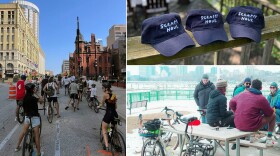They lift your spirits, prompt you to think, make you feel grateful and inspire you to do more. They connect you to our community, shining a spotlight on what's good about our city. They're stories that are Uniquely Milwaukee, sponsored by the Milwaukee Public Library.
“A lot of dreaming keeps Black people safe because we’ve had to imagine and reimagine systems that have not cared for us to be different.”
— Yante Turner, Sun-Seeker MKE
Sun-Seeker MKE are dreamers, artists, abolitionists, chosen family and joy makers — all working hard to reimagine what safety and care looks like for black trans and queer folks. Everyone involved with the Black trans abolitionist organization understands the solutions to oppression, harm and liberation come from the people within the communities they serve.
I spoke with Nick Berkley, Yante Turner and Jakayla (Jay) Bridges of Sun-Seeker MKE during the DJ Takeover on the Afternoon Drive last week. They curated a full hour of songs that both reflect and inspire their mission, and we looked at the work of their organization through the lens of art and music.
“When we talk about creativity and making organizing desirable, art for us has been that lens.” explained Turner, who has been with Sun-Seeker MKE for over four years. They are not reaching for professionalism or perfectionism, but rather striving for authenticity that’s made available through art and music.
It’s an organization of activists, academics and mobilizers who aren’t content with theory. They move Black trans safety from conversation to action through campaigns like their fundraiser for a rapid-response mobile crisis and care collaboration unit — the latest example of their hyperlocal focus so communities can, as Turner said, “have sovereignty over what their safety looks like. … We all need joy and care to be free of something.”
He explained that the experimental framework of a crisis-care unit may look like pods in neighborhoods all over the city of Milwaukee, which would “start with the neighborhoods that data calls high risk.”
Bridges added, “The people that are experiencing the effects of capitalism, imperialism, racism, discrimination — they are closer to the solution than anyone else because they are, we are actively experiencing it.”
I was curious about how to sustain a resource system like this, and of course they had an answer. Their plan is to not only continue collaborating with other local organizations for support, but also pass on these tools of care to younger generations.
Currently, they partner with neighboring organization Weber’s Greenhouse to bring together folks from the 53209 ZIP code and teach them how community members can care for each other.
“We just did ‘Stop The Bleed Training.’ We taught them how to pack and actively stop a gunshot wound,” Bridges said. “Almost 73% of people who are injured by gunshot wounds, the main cause of death is bleeding out.”
He went on to explain that the training goes beyond biology. They also want to limit fear by teaching people how to lean into their community, and as a result gain autonomy and control over these situations.
While Sun-Seeker MKE has an eye on the entire community, they also recognize young people are especially important to reach through programs like their Youth Empowerment for Leadership and Liberation (YELL) Council. Made up of eight members between the ages of 15 and 21, the group is empowered to “reallocate funds,” Turner said. “The funds they have will go toward finding solutions to end incarceration in our communities.
“They are system-impacted kids, and now they have the money to back it up and be like, ‘OK, this is what I'll put this money toward because I believe that this will change.’”
You can hear more from Berkley, Turner and Bridges in this episode via the player at the top of the page or wherever you get your podcasts. And to learn more about how Sun-Seeker MKE is working toward Black queer and trans safety, follow them on Instagram.









